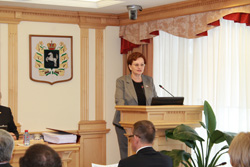
The Legislative Duma of Tomsk Oblast
March 27, 2014. Address by Oksana Kozlovskaya
at the 29th Session of the Legislative Duma of Tomsk Oblast
at the 29th Session of the Legislative Duma of Tomsk Oblast
Duma Chairman Oksana Kozlovskaya opened the session by congratulating the audience upon an anniversary – on this day (March 27, 1994) 20 years ago the first regional parliamentary elections took place, in compliance with the Presidential Decree.
Oksana Kozlovskaya opened the session by congratulating the audience upon an anniversary - on this day (March 27, 1994) 20 years ago the first regional parliamentary elections took place, in compliance with the Presidential Decree.
 In her traditional speech the speaker covered the latest events:
In her traditional speech the speaker covered the latest events:
“Last month was marked with two momentous events: return of Crimea and Sevastopol to Russia and ultimate victory of our Paralympic team in Sochi. Absolute maximum of Russian paralympic athletes is 80 medals, including 30 gold medals.”
Yet key topic of the day is events in Ukraine
The Crimea referendum result is indisputable - almost 97 per cent of the peninsula citizens voted for joining Russia.
Along with the Crimea citizens waiting for this day so long, over 90 per cent of the Russian citizens are unanimously speaking in support of Crimea and Sevastopol joining our country. In his extraordinary Address to the Federal Assembly the Russian President said, “We will obviously face external counteraction, but we must decide for ourselves whether we are ready to stand up for our national interests or whether we will keep surrendering them and surrender to nowhere”.
Russia consists of 85 entities now. The USA and European Union cannot come to terms with it at the moment. Hopefully, the common sense and economic interests of the nation states will prevail.
Ukrainian crisis dramatized importance and value of family
Family is again becoming one of the key priorities of the national policy. Key social objectives in Russia are providing favorable conditions for birth rate growth, protecting motherhood and childhood, enhancing the family institution - as per the President at the latest session of the State Council Presidium.
This is propped up by surveys: 93 per cent of our citizens would like to start a happy family and bring up good children. The society has formed its understanding of an ideal family. The majority of Russians think that it is based on mutual understanding and respect between the spouses. Financial welfare of a family is the second priority. The third one - and this is extremely important - a family must include both parents and children.
Having a family on the top in the hierarchy of their priorities, Russian citizens do not consider official marriage as a necessary apanage of life. Civil marriage is a norm as well as extramarital birth.
By the way, the State Duma is actively working on amendments to the Family Code and some amendments will quite possibly refer to ‘civil marriages’.
Family support is a national priority in most countries. Experiences are different but financial aid is mainstream everywhere. In Germany, child allowance or, as we call it, ‘child money’ is paid for all children on a differential basis, depending on age (for one child as well). However, only 9 per cent of German families have three and more children.
The French system of national family support is interesting. Family policy in this country is considered as the most advanced in Europe. It is based on stimulating employment of parents and developing child care services.
Progressive implementation of the whole set of targeted measures allowed this country to achieve the highest birth rate in Europe (2.1 children per woman). And this is due to high employment rate among women (over 70 per cent) and owing to the fact that 99 per cent of all children from 3 to 6 years of age go to various child centers.
In Russia, at the end of 2013, for the first time the summary birth rate was 1.7 child per woman, which was higher than that of most European countries.
In Tomsk Oblast it is 1.6 - same as in Germany.
According to statistics, over 93 thousand families and almost 205 thousand children live in the region. For 5 years already Tomsk Oblast has been enjoying a demographic ‘surplus’.
Over 20 laws and 22 types of social support for families with children are in place in the region. Annually the budget allocates approximately 1.2bn rules to fund them.
The key objective of today for the state is to provide conditions for stable family welfare. And this means that a family policy vector must be changed and targeted at improving the quality of life of an ordinary Russian family and its status in the society.
On the agenda
There are 37 items on the Duma’s agenda.
